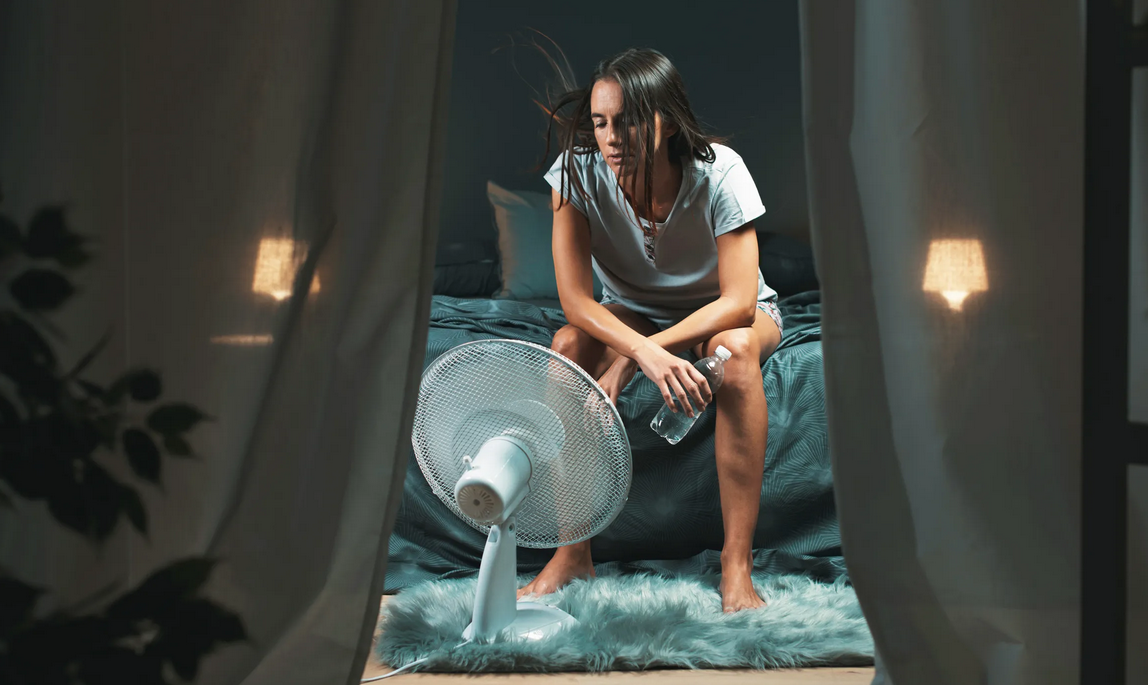Is it raining with sweat if you sleep at all? That’s the horror of those who live through heat waves across the world.
California‘s temperatures are hitting record high Fahrenheit. These rising temperatures are causing the electrical grid to reach capacity. In the UK and Western Europe, recurring heat waves are baking residents and tourists alike, sparking wildfires and fostering drought while Europe is suffering energy supply shortfalls as a result of Russia‘s restrictions on the delivery of natural gas to this region.
Many homes and businesses in the region do not incorporate air conditioning, leaving people with no choice but to deal with extreme heat. In the past, central air conditioning was not widely available in certain areas of the UK and Europe, and high temperatures were unforeseeable. An ongoing study carried out in 2020 predicts that abnormally warm temperatures will last in the country within the next 35 years.
It is not just the excessively hot weather at night that is falling as they should. In February 2017, a study revealed a 36 percent increase in the number of nights that must be described as cool, with a damp medium required to bring wildfires under control.
Rest experiences most
“Rest is an essential capability important for versatile physical and mental prosperity,” as per a survey distributed Thursday in the Journal of Sleep Research, which addresses the wellbeing effect of dozing in hotter temperatures and gives tips on the best way to adapt.
To get the best quality rest, specialists have long suggested dozing in a cool room – somewhere in the range of 60 and 67 degrees Fahrenheit (15.6 to 19.4 degrees Celsius) is ideal. What happens when you can’t accomplish that during an intensity wave?
Studies have shown higher evening temperatures increment alertness and decrease profound wave and REM (quick eye development), both basic to how well the body fixes and invigorates itself around evening time.
Openness to warm waves during pregnancy might be related with unfavorable results, for example, preterm birth, as per a recent report. More established grown-ups may have higher pulses and more physiological pressure while resting in hotter temperatures. A 2008 Australian concentrate even tracked down passings because of mental and social problems rose during heat waves, particularly for more seasoned grown-ups.
Ways to rest in the intensity
On the off chance that we figure out how to more readily manage rest issues during heat waves, we could possibly restrict the adverse consequence on our wellbeing, as per a group of specialists from the European Insomnia Network, who composed the survey.
Here are a portion of the top tips from the survey, alongside ideas from rest specialists in the United States who were not engaged with the distribution.
1) Stay hydrated. Drinking a lot of water during the day can assist your body with bettering control your temperature around evening time.
Yet, don’t drink for the little while before bed, or you’ll wind up waking yourself in the night to go to the restroom, said rest expert Dr. Raj Dasgupta, an academic administrator of clinical medication at the Keck School of Medicine at the University of Southern California. All things considered, “have a go at sucking on ice 3D shapes before bed.”
Eating lighter dinners during the day might help too, said Dr. Phyllis Zee, head of rest medication and teacher of nervous system science at Northwestern University Feinberg School of Medicine in Chicago.
2) Choose free, cotton clothing – keep away from artificial materials, which can trap heat close to the skin.
3) If you’re sufficiently fortunate to have a cooler period during the day, open windows and entryways and begin up fans to ventilate the room, then, at that point, close it off when the temperature increases.
4) If there are no breaks from the intensity, close blinds, pull window conceals, and give your best “to keep the house and room as cool and dull as conceivable both during constantly,” the audit recommended.
5) Avoid liquor at night – it dries out the body and sets you up for evening time sweats.
6) For you and your kid, put away an hour or more before sleep time for quieting exercises, for example, “perusing a book, paying attention to a story or to music. This could help in chilling off and unwinding,” the survey added.
7) Before you hit that hot sack, take a tepid or cool (yet not cold) shower or foot shower, which might assist with diminishing your intensity stress and set you up for rest. How does that occur?
“Your internal heat level brings down after you leave the shower or shower as your body adjusts to the cooler climate,” Dasputa said. “This decrease in temperature readies your body for rest in light of the fact that our internal heat level has a characteristic circadian beat – the body is prepared to chill off when you set down and warm up when you get up.”
8) Try your best to hold your room under 77 degrees Fahrenheit (25 degrees Celsius) if possible. To do as such, have a go at utilizing roof fans or floor or bedside electric fans, which use “up to 50-times less power” than cooling,” the survey noted.
“There are likewise genuinely modest ice cooling fans that can be set close to the bed,” Zee said in an email. “Assuming you can’t keep the room cool, dozing briefly on lower floors like the storm cellar (on the off chance that there is one) will be cooler.”
Tips to the side, the wellbeing influence on individuals who are utilized to mild environments has not been vigorously investigated, said specialist Dr. Bhanu Prakash Kolla, a rest medication expert in the Center for Sleep Medicine at the Mayo Clinic in Rochester, Minnesota.
Concentrating on individuals who live in sweltering nations and have adjusted to the blistering environment would be useful too, Kolla said: “There is no proof that they have more prominent paces of sleep deprivation or other rest disturbance or as a matter of fact rest inadequately. In this way almost certainly, we can learn numerous things about the versatile measures utilized by these societies that have lived in a lot more sizzling environments for a long time.”



